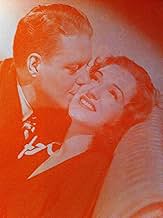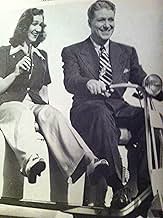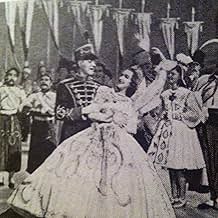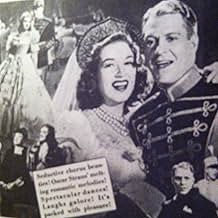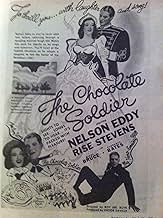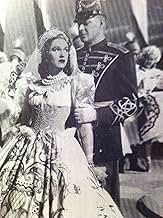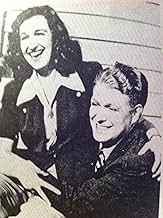Aggiungi una trama nella tua linguaMaria and Karl Lang are the singing duo of Vienna. Maria is very flirtatious and Karl very jealous. Karl decides to masquerade as a Russian guardsman and attempts to make Maria flirt with hi... Leggi tuttoMaria and Karl Lang are the singing duo of Vienna. Maria is very flirtatious and Karl very jealous. Karl decides to masquerade as a Russian guardsman and attempts to make Maria flirt with him - to test her loyalty to him. As the Russian, Karl makes a vigorous attempt to seduce Ma... Leggi tuttoMaria and Karl Lang are the singing duo of Vienna. Maria is very flirtatious and Karl very jealous. Karl decides to masquerade as a Russian guardsman and attempts to make Maria flirt with him - to test her loyalty to him. As the Russian, Karl makes a vigorous attempt to seduce Maria. For a moment she accepts then rejects him. Karl is left in turmoil.
- Regia
- Sceneggiatura
- Star
- Candidato a 3 Oscar
- 3 vittorie e 3 candidature totali
- Magda
- (as Dorothy Gilmore)
- Undetermined Secondary Role
- (non citato nei titoli originali)
- Singer - 'Seek the Spy' Sequence
- (non citato nei titoli originali)
- Emile, Voice Coach
- (non citato nei titoli originali)
- Waiter at the Double Eagle
- (non citato nei titoli originali)
- Messenger with Note
- (non citato nei titoli originali)
- Solo Bit in 'Thank the Lord the War is Over' Number
- (non citato nei titoli originali)
- Performer in Gypsy Café Sequence
- (non citato nei titoli originali)
- Solo Bit in 'Thank the Lord the War is Over' Number
- (non citato nei titoli originali)
- Stage Manager
- (non citato nei titoli originali)
- Flute Player
- (non citato nei titoli originali)
Recensioni in evidenza
I will agree that the story about a man suspecting his wife of infidelity is predictable and creaks with age, and the choreography at times was disappointingly unexciting and pedestrian. But putting these flaws aside, this is a truly beautiful and entertaining film. One thing for certain, the production values were simply fabulous. The lavish costumes and beautiful sets were really a wonder to look at. The score is phenomenal, featuring some Oscar Strauss hits like My Hero, Thank the Lord the War is Over, Sympathy and of course the Chocolate Soldier, and some well known opera gems like Mon Couer s'oeuvre a Ta voix from Saint Saens's Samson and Delilah and Evening Star from Wagner's Tannhauser. While my Lady Sleeps was stunning too, but the real highlight was the enormously entertaining Song of the Flea. The performances were sublime; while the beautiful Rise Stevens is probably at her loveliest and sings beautifully, it is the wonderful undervalued Nelson Eddy who steals the show with his beautiful resonant voice and flawless comic timing and stage presence. Nigel Bruce and Florence Bates are good too.
All in all, a beautiful film. Not perfect, but the production values, score and performances make it a treat. 8/10 Bethany Cox
If nothing else, Louis B. Mayer prided himself on bringing class to the cinema and he never met a diva he didn't want to sign for MGM. Eddy, who didn't really get along with Mayer and was soon to leave MGM after a spat with him, I think knew just how much it would cost to sign someone from the outside and he made Mayer spend the dough.
Rise Stevens had appeared with him on radio so Nelson's motives weren't completely to hurt Mayer financially. They worked well together here and maybe they could have been a screen team themselves. Rise Stevens had a good gift for comedy, very much like that other singer/actress Irene Dunne. But after The Chocolate Soldier and an appearance in Going My Way with Bing Crosby, she left the silver screen.
Like the Eddy/MacDonald feature Sweethearts this utilizes the music, but not the plot. Like Sweethearts the leads are appearing on stage in The Chocolate Soldier, but it's a backstage story for the plot. And the plot used is The Guardsman which MGM owned the rights to, having filmed it in 1931 with Alfred Lunt and Lynne Fontanne.
Eddy and Stevens look so good and sing so beautifully on stage, but that doesn't account for Eddy's all consuming jealousy over his wife. His Othello act doesn't even need an Iago for a boost, he's creating all kinds of imaginary lovers for Stevens. Finally he decides to put her to the test, playing a phony Russian opera singer with beard and Cossack costume. Stevens however is up to the challenge and it's a pretty funny film that follows.
The two leads have some nice duets together, particularly the My Hero duet from Oscar Straus's Chocolate Soldier. But the big hits of this film are Moussorgsky's Song of the Flea and another song While My Lady Sleeps written by Bronislau Kaper and Gus Kahn. Both were standard items in Nelson Eddy concerts. Eddy recorded both, however the version I have of the Song of the Flea is in English and in The Chocolate Soldier, Nelson sings it in the original Russian.
It was a good teaming Eddy and Stevens and since right after this Jeanette and Nelson would be doing their last film together, I Married an Angel, it's unfortunate Stevens and Eddy did not do a few more films together themselves.
Both singers are in fine voice but it's Eddy who steals the show with his rendition of "Song of the Flea". Nelson Eddy was rarely praised for his acting prowess, but here he delivers a solid, sensational performance with great flair and dexterity. Absolutely his best work as an actor!
The pleasant supporting cast includes Nigel Bruce and Florence Bates.
Lo sapevi?
- QuizThis has interesting origins from musical and non-musical plays. In 1909, the operetta "The Chocolate Soldier" opened in New York. This was based on the non-musical play "Arms and the Man" by George Bernard Shaw. However, Shaw voiced objections to his play being adapted as an operetta. A silent film adaptation, The Chocolate Soldier (1914), based on the New York operetta, omitted any reference to George Bernard Shaw. In 1911, a Hungarian non-musical play "Testör" ("The Guardsman") by Ferenc Molnár, opened in Budapest. In 1941 when this film was made, George Bernard Shaw was still alive. Therefore, the music of the New York operetta and the plot of the Hungarian non-musical play "The Guardsman" were used.
- BlooperWhen Eddy is impersonating a Russian singer, the nightclub impresario introduces him as a bass, but then Eddy sings. He is a baritone.
- ConnessioniFeatured in We Must Have Music (1941)
- Colonne sonoreMy Hero
(1909) (uncredited)
Music by Oscar Straus
Musical adaptation by Bronislau Kaper and Herbert Stothart (1941)
Original lyrics by Rudolph Bernauer and Leopold Jacobson
English lyrics by Hugh Stanislaus Stange (as Stanislaus Stange)
Additional lyrics by Gus Kahn (1941)
Sung by Risë Stevens and Nelson Eddy in the show
Hummed a cappella by Florence Bates
Sung by Risë Stevens in the Gypsy Café
Reprised by Risë Stevens and Nelson Eddy in the show at the end
I più visti
Dettagli
- Tempo di esecuzione
- 1h 42min(102 min)
- Colore
- Proporzioni
- 1.37 : 1

